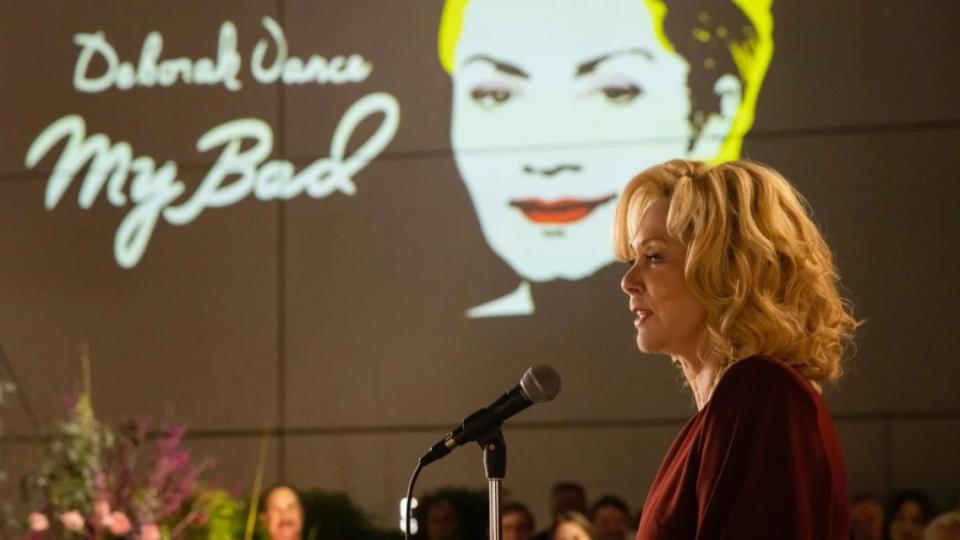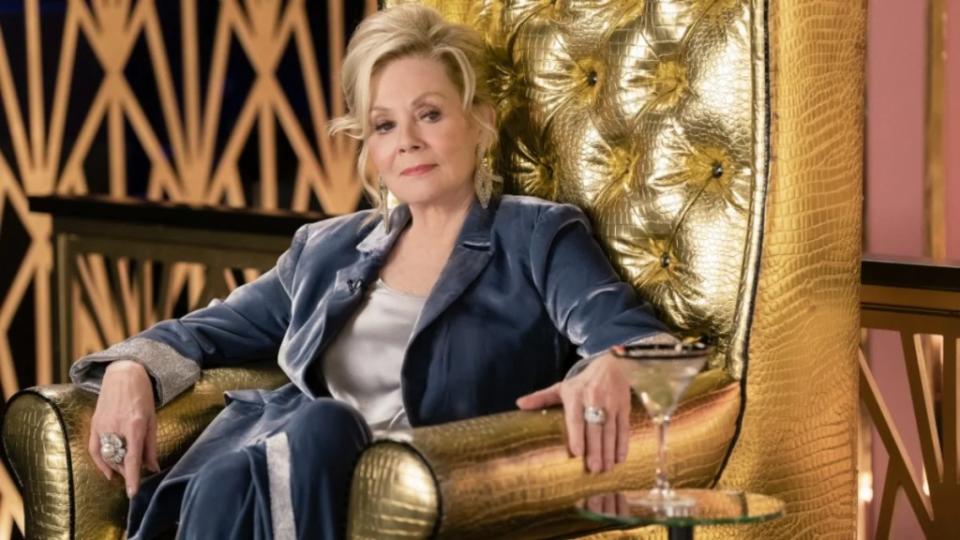‘Hacks’ Creators Share the Secret to Writing Deborah Vance’s Comedy
Note: This story contains spoilers from “Hacks” Season 3, Episode 8.
It was inevitable that Deborah Vance (Jean Smart) was going to flirt with cancellation in the world of “Hacks.” So when it finally happened in Season 3, it’s not particularly surprising. What is surprising about “Yes, And” isn’t just Deborah’s response to the controversy, but how the episode exposed one of the most impressive elements of this Emmy-winning comedy: The work that goes into writing Deborah’s jokes.
“Hacks” occupies a special place when it comes to comedies about comedy. Because it’s wholly original, it doesn’t have the work of an established comedian to fall back on, like how “Seinfeld” episodes were often based on a Jerry Seinfeld bit. Also, because of the tone and point of the series, the Max series never dumbs down the comedy, a trick sillier shows often employ, like the often-mocked “Fart Doctor” sketches in “30 Rock.” Instead, when Deborah Vance is onstage, she’s trying to make her entire audience laugh, both her fictional one and the real streaming audience.
“[The standup comedy] has always been something that we work on really hard,” series executive producer Jen Statsky told TheWrap. She co-created “Hacks” alongside Lucia Aniello and Paul W. Downs. “It’s really a group effort. It’s something that we think about and lose some sleep.
“A lot of writing, a lot of rewriting,” Downs said.

This labor of love is especially apparent in “Yes, And.” The eighth episode in Season 3 revolves around Deborah going to Berkeley to accept an honorary doctorate. But once a video starts to surface of Deborah’s more controversial material over the decades, a trip that’s meant to result in a puff piece turns into a moment that could potentially end her career, and ruin her late night aspirations. By the midpoint of the episode, the threat of a student protest shuts down Deborah’s show, so Deborah and Ava (Hannah Einbinder) opt to attend a meeting with the offended students.
“That was really complicated because we wanted to both show jokes that, in the context of their time, would have happened and would have potentially worked but also that didn’t age well. We were also really conscientious of not trying any material that was really inflammatory or really offensive,” series co-creator and executive producer Paul W. Downs told TheWrap.
Some of those jokes include leaving a Spanish-to-English dictionary at the U.S.-Mexico border, calling dyslexia “lysdexia” and saying that Anita Hill “should be drinking Diet Coke.” In the 1990s, Hill publicly accused Supreme Court Justice Clarence Thomas of sexually assaulting her. A buzzy point of the hearing was Hill recounting a time when Thomas asked who put a pubic hair in his Coke.
Downs noted that joke was very “specific and about the time.” “It was a really very, very delicate needle to thread,” Downs said.
This degree of thought — ensuring that a joke could be plausibly funny over 30 years ago and making sure it falls exactly on the side of the line the story requires, all while writing something that isn’t so topical as to baffle modern audiences — is a balancing act the “Hacks” team has been performing since Season 1.
“It’s a complicated thing because you want it to be funny,” Statsky said, noting that the three creators want Deborah’s jokes to stand “on its own heels.” “It also has always been a reflection of where she’s at in her life and her art.”
In Season 1, an installment that started with Deborah Vance as the aging queen of Las Vegas, that meant making her act intentionally stale. Season 2 also had a comedic roughness to it, though in a slightly different way. That season, which largely followed Deborah and Ava trying out Deborah’s new act on the road, needed to be “not necessarily polished or great,” Statsky said. This was to show the evolution of her joke writing process as Deborah came to terms with the myriad of ways she had been wronged by the industry, and how she hurt those around her.
“In Season 3, she puts her comedy to use as a marketing tool to get this late night job,” Statsky explained.
When it comes to writing jokes for the one and only Deborah Vance, the process always starts with an episode’s story and where the characters are. “We’ll say, ‘We need her doing standup here because we’re showing that she’s working out the material on the tour, and it’s really not going well,'” Aniello said.

If a scene calls for a “broad” joke like that, anything goes as long as it’s in Deborah’s voice and it largely respects Ava’s view that comedy should never punch down. “Let’s just generate a ton of jokes and go with what is the funniest,” Aniello explained.
Other times, a scene calls for a very specific joke, such as an episode that deals with Deborah’s relationship with her daughter DJ (Kaitlin Olson) or about her losing dream job of hosting a late night show. “It’s really episode and scene specific of what the writing demands,” Aniello said.
Just because a Deborah joke makes it way into the script, that doesn’t mean it’s going to make it to the final cut. There is a lot more writing that happens during filming.
“We see how Jean takes it on. We try and adjust the punchline, or take a couple of words out or try a whole new thing,” Downs said. “Those are the things that we evolve constantly.”
Statsky noted that if Smart is “more tickled” by a joke, there’s a higher chance that alternative joke will make it into filming. “It’s a funnier performance. So she also has some say.”
Whenever the camera cuts to Deborah telling a joke on stage, it can feel like jumping into the middle of an ongoing standup set. That’s a well-crafted illusion, so don’t expect any secret cuts of Jean Smart performing full cohesive hours of comedy anytime soon.
“Those onstage moments are used very specifically, and we pretty much know what we want to have portrayed,” Downs said. “As much as we do want the show to accurately portray the world of comedy — both onstage and off, whether it’s in a green room or on a tour bus or what have you — we always want to also see how these comedians write and work offstage.”
The Season 3 finale of “Hacks” premieres Thursday, May 30, on Max.
The post ‘Hacks’ Creators Share the Secret to Writing Deborah Vance’s Comedy appeared first on TheWrap.

 Yahoo News
Yahoo News 
